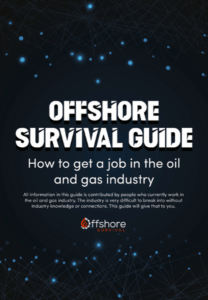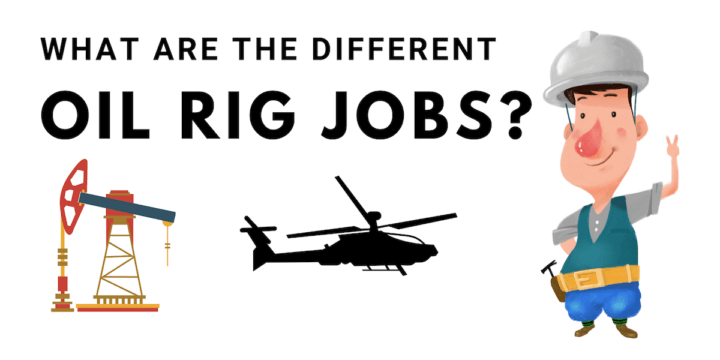
Oil rig jobs, what are they?
There are many different oil rig jobs that are ubiquitous to large production rigs, and there are an enormous number of specialised jobs that are project based.
The other question people ask is, ‘can I get a job on a rig with no experience’.
The truth is, that it’s really not easy, but the other truth… is that everyone first job offshore was with no offshore experience. You just need to understand where you fit and how your skills are useful, keep asking until you get lucky.
Let's take a look at the jobs offshore
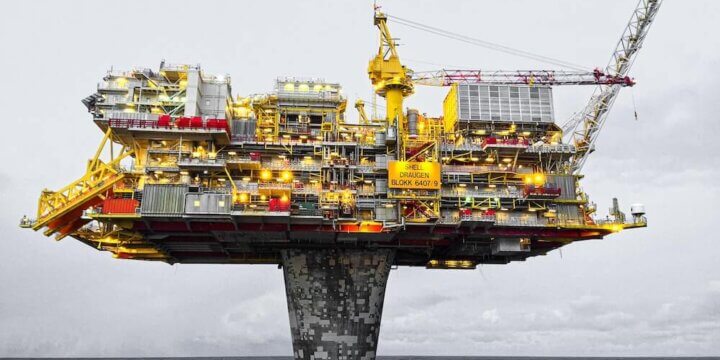
Jobs for people new to the industry
First, let’s look at the jobs considered most useful, and then the jobs most accessible to people new to the oil industry, working on rigs and boats etc.
There are many skills in the civil sector that are very useful offshore, let’s take a look.
Most useful skills offshore
It is going to sound obvious after that first sentence, but any experience with metal, heavy machinary, large metal construction and pipework is very useful.
The most useful hands-on mechanical skills/experience are the following:,
- Pipework / plumbing / pipe fitting
- Metal work, fabrication and welding
- Handy man – an all rounder who can fix/build things with metal
- Mechanics / heavy machinery operators
- Cranes / lifting / rigging / banksman
- Building scaffolding
Crossover Rig Jobs
The following jobs are more accessible to people trying to get a job on a rig with no experience, as a result of them being clearly connected to jobs common in other industries.
- Stewards (catering/cleaning)
- Scaffolders
- Industrial Painters
- Plumbers
- Welders
- Sand blasting
- Admin/logistics
Warehouse - Crane operators
- Riggers, Banksman/Slingers
- Medics, doctors(GP)
- Engine Room Mechanics
- Electricians
- Fire fighting trained personnel
- Helicopter landing crew (HLO)
- Air traffic controllers
- Experience with pipework
- lacquer /
industrial insulation - Industrial / chemical cleaning
- Flow control
Farmer (I’ll explain later)
For roles in Offshore wind, Carbon Capture and Storage (oil/gas in reverse), High Voltage (Grid) and Oil and gas Decom, there is a course that will be of interest to you, link below.
Pre-register
Energy Industry Course & Career Guide
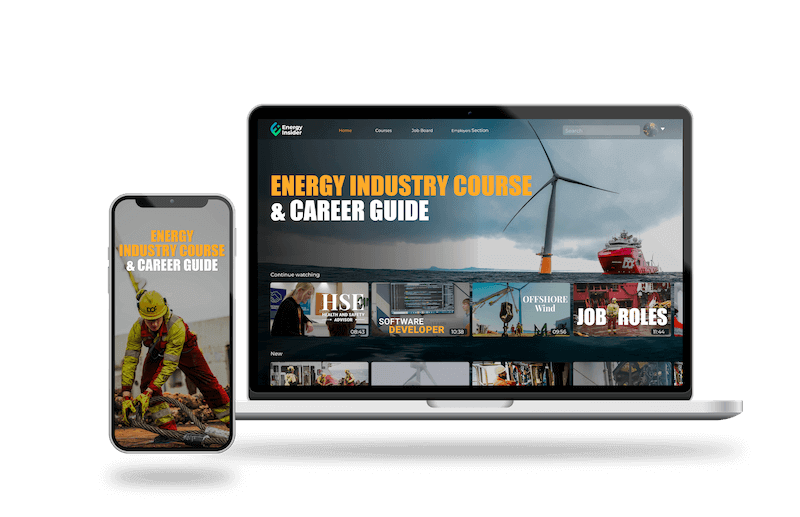
“Gain exclusive insights into the energy industry and career opportunities to help you enter one of the world’s fastest-growing and evolving sectors.”
HELO crew (HLO) / Fire Rescue FYI
Bear in mind that sometimes roles like Helicopter landing crew(HLO), or fire fighting crew both on rigs and boats, are secondary roles to a person’s main job(usually).
If you get the Helicopter training, or the fire fighting training then this will increase your chances for getting a job because you add to their quota of required safety personnel on the rig or boat. And if they are suddenly short of their quota then they’ll hire fast.
If you end up doing HLO or fire jobs in addition to your normal job you will be paid extra.
Working at heights FYI
There are lots of opportunities for people with rope access qualifications, as some of the locations on a rig are easier by rope than by scaffold.
But don’t think of it so much as job in itself, it more often helps to do your job, at height. If you are experienced and qualified to work at height then this is even more in your favour. because there are a lot of high and precarious spots offshore.
Rope Access
Rope access is a course that permits you to do your job at height, as the name suggests, using a rope to get to access your job site. On a rig rope access is common and often required. If you have a trade or skill already then a rope access course ‘may’ help get you a job. Especially applicable to painters and riggers.
Offshore Riggers
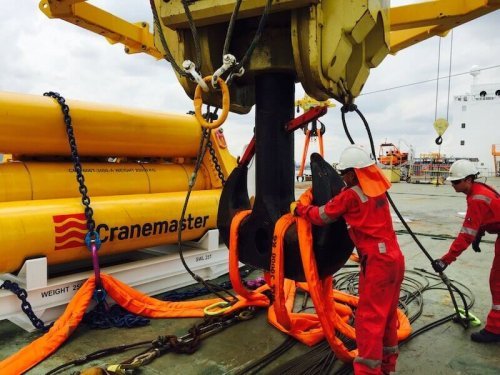
A ‘rigger’ is a person who performs the ‘rigging and lifting tasks’, and there are crews of riggers on both rigs and vessels. They are an important work party offshore and their services are needed all the time, basically any time the crane is used, and also any time there is a heavy lift, which is often. If you have experience rigging on land this is a clear route for you if you fancy the offshore life.
Rigger Courses
There are 2 main courses connected to being a rigger; ‘banksman slinger‘ and ‘rigging and lifting’. Opito Rigging and lifting course level 3 is required to work offshore, You can also do an NVQ equivalent for rigging but generally the OPITO(offshore standard) qualification is for offshore. You don’t need to do a banksman slinger course to be a rigger offshore but you need the rigger level 3. Many riggers offshore don’t have their banksman slinger cert.
How to get rigging and lifting level 3
Level 1 is introduction to rigging and lifting. You will get a logbook- once you have completed all the required tasks, got them signed by a level 3 person. You can sit your level 3 assessment(2 day) If you have previous experience, you can get a reputable lifting/construction company to write you a letter saying that you are competent to level 3 standard.
Rigger/Welder
This is a guy who can do both. If you are already a welder, and then become a rigger, you have a higher chance of getting a job.
-We have a detailed guide 38 pages written by offshore workers giving insider knowledge on the industry, if you want to check it out, here is the link to get the download, it used to be a paid guide, now it’s free.
Other specialised rig and offshore jobs that cross over well
Surveyors
This is a desired skill for mapping wells and directing drillers, and also for planning/mapping the routes for pipelines/umbilicals. There is a lot going on subsea and below rigs if you have experience and skills in mapping, this is a well paid job.
Chemists and chemical engineers
Chemists play an important part in drilling, analysing the rock, developing chemicals to better drill through the different rocks, and developing and adapting the properties of ‘mud’ to pump into down the pipe. (Mud is a chemical liquid mix that is developed to help the process of drilling, it looks like mud).
Instrument technicians
There are so many instruments offshore; gauges, flow meters, pressure transducers, temperature indicators etc, that there are instrument departments within companies just to make sure that there equipment are measuring accurately.
Certifying equipment is a big part of their legal due diligence to have their equipment tested periodically (every 6 months / 1 year etc). So that means there is lots of work to be done to check, test and maintain this equipment.
Electricians
Electricians are really useful, not only on rigs as one of their electricians(which they need), but also for any of the companies who have electrical equipment, and there are many of those.
Hydraulic specialists
There is heavy machinery everywhere offshore, and plenty of hydraulic powerpacks to power them.
If you are experienced with hydraulics, make sure you mention it in your CV.
Geologists
If you are a geologist, there is plenty of work for you in the drilling sector, (when oil prices are high). Drilling through the earth for thousands of meters, they travel through rock formations that have a big impact on the tools used. The work done by geologists has a big influence on the success of a project.
Mathematician - Calculus FYI
If you have ever done calculus, (area under a sin curve, differentiation etc) and the thought to yourself ‘when is anyone ever going to need that!!??’
Well… turns out that is really fundamental for reservoir engineering and calculating the amount of oil and gas in a well. And those guys that decided to get good at that, work in high paid jobs for the main operators, shell BP chevron etc.
Service companies, perfect for Diesel Mechanics
The following companies will heavily appreciate diesel mechanics and heavy machinery operators, if you are experienced with pumps and compressors then even better. Pipe fitters and plumbers have higher chances of getting a job. There is also a need
for electricians.
Enermech – Pipeline process services(PPS)
Baker Hughes – Coil tubing divisions.
Aker Solutions
Halliburton
IKM Testing
This is really just a sample set because there are so many companies that have diesel driven pumps and equipment.
Pumps and pump operators
In oil and gas, there is a lot of pumping, and not pumping the product (oil/gas). In so many different areas they will need liquid or gas pumped. For pumping down the well during drilling, filling new pipelines for testing or pressure testing itself, purging, dewatering, it is an essential job.
Basically pumping is the fundamentals of the whole operation.
Pumping mud
For example, you pump mud down the well while in the drilling phase, you do that to bring up the debris, and also you pressurise against the well itself, because if the well has more pressure that the mud, then it’s going to blow out, and you don’t want that!
Pumping cement
You pump cement down to make the well casing, basically building a cement structure from the surface into the well.
You might end up pumping all kinds of things down a well.
Pumping chemical.
You may have pumps for pumping different chemicals into the pipeline or pipework, for cleaning for example.
Pumping nitrogen (N2)
Pumping liquid nitrogen is often done, not because they want the cold liquid nitrogen but because liquid nitrogen is a good way of storing nitrogen, 600x expansion ratio. And the reason why you need nitrogen is because it is ‘inert’ meaning that it doesn’t react or explode, so if you want to remove oil and gas from a pipe before opening it, you will probably pump nitrogen through it until it is clean. Air with the high oxygen percentage is explosive.
It’s not always liquid nitrogen, it is sometimes membrane/N2 production units, mentioned later in the compressor section.
Pumping water
There is a number of reasons for pumping water, you have water pumps on a rig for potable water(showering washing hands etc) and you have seawater for cooling.
Sometimes you pump water into the well to force pressure in the well to get more oil out.
There is pumping of water into a new pipeline before pressure testing it. Then afterwards you often use the above mentioned Nitrogen to pump the water back out.
Pumping product
The rig itself is often a big pumping station, and when it’s oil and there is not enough pressure in the well pushing it through the system, you may need to pump it.
Compressor operators
Another ever present piece of equipment is a compressor. And a compressor operator is a common job in oil and gas.
On a rig, and also a vessel/boat there is an a compressed air system constantly on and powered up usually called the ‘plant air’. So people can connect air powered equipment to it at any time. Powering tools pumps etc.
Often 3rd party companies, who bring their own kit to a rig or a boat, will bring their own compressor, to make sure they get the supply of air they need, at the specific pressure they need. That is really common, and those companies need people to operate their compressors (not that it is difficult).
ROV
ROV is a cool job, to be part of the crew that manage, repair, operate and fly the ROV.
What is an ROV? It’s a underwater remote operated vehicle. It flies about, with cameras lights, 2 articulated arms for opening, operating and holding things. It’s about the size of a small van.
It’s electrical and hydraulic mainly.And it’s really cool. They do any work that divers can’t get to for depth reasons, anything deeper than 300m.
Divers
Another cool job offshore, is the divers.
There are two main types of divers offshore, air divers and sat divers.
Whats the different between air divers and sat divers?
Air divers breath air, decompress after being under the water. They have a short working time due to having to decompress.
Sat divers, short for saturation divers, breath oxygen and helium, and live in a pressurised chamber, which is the same pressure as the depth they will work at. So that they don’t need to depressurise, and that they can work for long periods of time. These guys are on the big bucks, £1500/day. They are the highest paid non management positions in oil and gas. Even if you are an ‘advanced PADI diver’, don’t run and get your BOSIET and medical just yet, being a commercial diver requires a very intense qualification, that you look into carefully.
Communication jobs
Just like onshore, on rigs there are phone lines that is connected to the mainland, there is a full system of communication hardware on the rig, that needs to be installed and managed. There are companies that specialise in this, and people who have the job of being the ‘BT men'(or woman) of the rigs.
Bolting and connecting pipes together.
There are so many bits of pipe, large and small that are bolted together on rights, and when they want to change something out, you need to unbolt them and bolt in the new set. This is a specialised job that requires some training.
FYI divers do this underwater too.
Shutdown - busy times on a rig
Shutdowns on oil rigs are a very busy time, this is when they ‘shut down’ production.
During normal running of an oil rig, oil is flowing constantly from the depths of the earth, through the pipelines, all the separators, all the pumps, through the main trunk pipeline going back to shore, through the processing plant onshore. There is a lot going on, and while it is running the company is making 10s of millions of pounds per day. So….
The operator (the company that owns everything) doesn’t want to stop production, so all maintenance that requires to stop production is done all at the same time, for as short of time as possible. A lot of work happens during a shutdown, it is so busy, and there are so many people with different random jobs all over the place.
A shutdown might last 4 weeks, and with over 100 rigs in the north sea, there are large service companies that are busy all year round performing some specialised service on the rigs.
Drilling rigs - how they are different
On drilling rigs, there is a totally different purpose, they move around, over positions they think will be good for oil reserves, and start drilling.
There are a number of different jobs that are specific to drilling:
- Deck hands (job you do before becoming a roustabout)
- Roustabout
- Derrickman (works on the drilling derrick, the higher point where the next pipe is connected.
- Drillers
- LWD / MWD logging/measuring while drilling
- Chemists
- Geologists
- Marine crew, motor engineers (the rigs move around and need a crew to run the boat/marine side of things)
- Dynamic positioning engineers (the thruster system that controls the position of the boat on one spot)
FREE Guide
If you found this information useful, it was taken from opening pages of the Offshore Survival Guide. Below you can get more info on the guide if you’re really into the idea of working offshore.
This was written for people wanting to get into the industry, you can take a look at the guide. It includes lists of agencies, different companies, what they do, written in the same easy to read manner, with more specific company names and links, as well as clever ways to get contact details of the people that do the hiring. It’s about 36 pages as per Revision 3.

